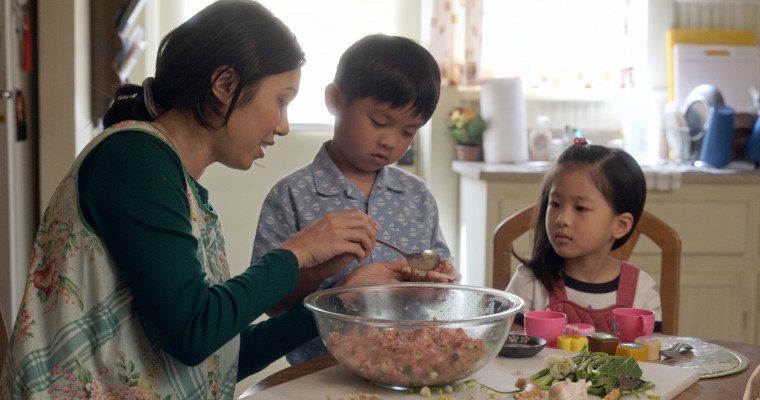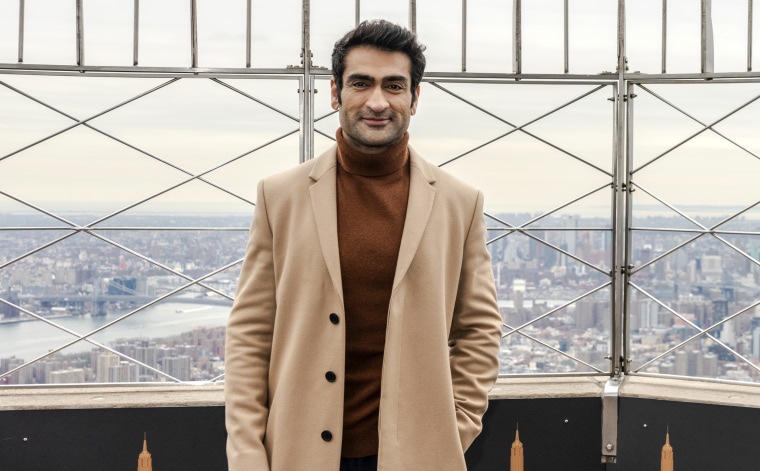Kumail Nanjiani has amassed a devoted following during his years in Hollywood, but the much-beloved comedic actor and boundary-pushing director says that like many other Asian Americans, he's still grappling with his own identity.
Despite the fans and critical acclaim, the Pakistani American says he shares the recognizable feeling of those who continue to look for a place to belong while negotiating the sometimes complementary but often conflicting values of the East and the West.
“It’s not something that I’ve figured out. I think my identity is still a work in progress. I don't feel Pakistani because I don't live in Pakistan and because people in Pakistan don't accept me as their own — and then same in America,” he told NBC News. “I think so much of feeling like you're part of a group depends on the group accepting your membership. And I feel like especially now in America, there are significant portions of the country that do not see me as American.”
Perhaps that’s why Nanjiani’s pivot to executive producing “Little America” — an immigrant anthology series threaded together by a search for the “feeling of home” — makes sense for him. The episodes are based on true stories and illuminate the bittersweet experiences of those trying to make it in America.

While the executive producer has said in the past that the show isn’t meant to be a political statement, he noted that by fleshing out different immigrant narratives, “Little America” will, perhaps unintentionally, make a point. It’s a series that’s premiering at a time when most Americans view immigrants favorably, however almost 30 percent feel that immigrants burden the United States by taking jobs, housing and health care, according to Pew Research. In fact, for one episode about a gay Syrian refugee, the show had to relocate the filming to Canada as many of the actors couldn’t enter the U.S. due to the Trump administration’s travel ban.
“We're not naive. We understand that showing immigrants as human beings is, unfortunately, a political statement. So we felt like we didn't need to make explicit political statements within the show because its very existence of the nature of the stories we're telling are the political statement,” Nanjiani, an immigrant himself, said. “Whether or not it can change people's minds, I don't know. I would love for people who have all sorts of political stances to see it, because I do think they'll see themselves as people who don't look or sound like this at all.”
One episode looks at a Chinese immigrant’s relationship to motherhood and identity while taking her children on an Alaskan cruise. Another delves into the story of a Nigerian student who connects to the country through cowboy culture. There’s also a piece about a 12-year-old whose parents, who are facing deportation, go back to India, leaving the boy to run their motel business. The series doesn’t shy away from specific cultural references or sprinkling foreign language throughout the episodes. Nanjiani said he wasn’t concerned with alienating any viewers with the honest cultural depictions that don’t often make it onto the small screen.
“I think that finding things that are specific to the culture, those little things that people from that culture might be like, ‘Oh, my God, I know that exact thing.’ I think that those details appeal to people not from that culture as well. They just feel authentic,” he said. “Those specific cultural differences and detailS actually help people connect to the universality of it a lot more. I think people will see like, 'Oh, I don't know this specific to this specific thing, but I understand the relationship because this is similar to the relationship I have to my mom or my dad or my kids.'”
The stories also lean into the trauma of the immigrant experience. Though the episodes offer a muted, hopeful spirit throughout, the sequence of events aren’t always happy. Instead, the series is peppered with a complicated mix of both devastation and optimism that immigrants so often confront. Pain, Nanjiani says, is necessary to produce profound art because of the universality of the emotion. After all, “every single person in life has had struggles or pain, obviously to very different degrees.”
“I think every story you tell has to have pain in it, it does have to have sacrifice in it, it does have to have struggle in it because otherwise it just doesn’t feel worth telling,” he said. “I even think the one mistake that recent comedies make is that they shy away from that stuff ... I think Hollywood thinks that comedy should be light and airy. And I think the opposite. I think the great comedies have pain in them. And I think that that actually makes them funnier. You know, I think it makes them spikier. It makes them more interesting.”
Now, having written and produced a series about immigrants alongside other big names like Lee Eisenberg, Alan Yang, in addition to Nanjiani's wife, Emily V. Gordon, the actor says he wants to see many more stories come to the fore. When it comes to Asian American stories, he says he still feels there needs to be a greater diversity of narratives on screen. Maybe, he wondered, if he saw more of his own story normalized in the mainstream media, would his identity still pose the same struggle for him?
“If I'd seen more people like myself in American pop culture, I'd feel a little more welcome or a part of this society,” he said. “What you see in pop culture is supposed to represent what America looks like, right? And it really still doesn't.”
